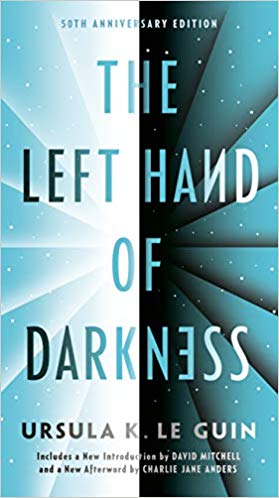
On a planet called Winter, or Gethen in the native language, lives a population of gender-fluid individuals who go into kemmer only once a month, becoming either female or male for only a couple of days.
Living on Gethen, although originally from planet Terra, Genly Ai is an ambassador of the intergalactic union called the Ekumen. Like everyone on Terra, he is shows a fixed gender all year round, male in this case. His purpose is to persuade both nations on the planet to join the intergalactic coalition in a league for the free exchange of knowledge.
Genly Ai, however, is used to a society made of male and females, with all the stereotypes that come with it. Two years after his arrival on Gethen, he still struggles to relate to a population so different from him and, by the same token, Gethenians don’t trust Genly Ai and look at him as odd, a pervert who shows off his kemmer the whole time.
Karhide’s prime minister, Estraven, is one of the few who believes in Genly Ai and his message. Estraven, not male nor female, will try to explain to Genly Ai the ways of Gethen and show him the meaning of shifgrethor, an antique word for ‘shadow’ and a sort of code of social conduct.
As remote as the circumstances of the story are, LeGuin is able to create characters we can immediately relate to. The narrative might be difficult – she called it hard-lit herself – but we can’t help feeling close to Estraven and Genly Ai during their journey of love and friendship, through a world that is both magnificent and deadly.
The absence of gender on Gethen is the main theme explored in this tale. Like many other stories written by LeGuin, this is a thought experiment on society, where she takes gender out of the equation to see what is left. This way we’re exploring a world that is only just starting to consider territoriality and war, while patriotism is an embryo of idea. It’s a place where anybody can bear children, and where rape and sexual violence are unknown. To add to the experience, we witness all of this through the eyes of an alien visitor, who slowly has to admit that his mind wasn’t as open as he thought it was.
When the book was published in 1969, it was welcomed as a game-changer. Fifty years on, Genly Ai’s story is still relevant, and not only for the take on gender fluidity.
Estraven and Genly Ai are not shy of conversations about patriotism, which they define as ‘love of one’s country’ – but does that also mean the hate of one’s un-country? And how is it that Estraven is exiled and treated as traitor in Karhide, when all s/he ever wanted was the country’s good.
Ursula LeGuin has Genly Ai starting his report by saying: “Truth is a matter of the imagination.” Incidentally, this is LeGuin’s take on science-fiction as a genre. What she’s trying to tell us is that there isn’t just one truth and that opposite sides are closer together than what it might look like. Lines are blurred, and shadows spring up everywhere in broad sunlight.
Gethenians probably said it best: “Light is the left hand of darkness, and darkness is the right hand of light. Two are one, life and death, lying together like lovers in kemmer, like hands joined together, like the end and the way.”
Maddie Marzola






